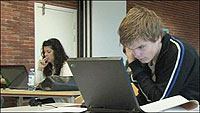In Denmark, the government has taken the bold step of allowing pupils full access to the internet during their final school year exams. A total of 14 colleges in Denmark are piloting the new system of exams and all schools in the country have been invited to join the scheme by 2011.


In Denmark, the government has taken the bold step of allowing pupils full access to the internet during their final school year exams.
A total of 14 colleges in Denmark are piloting the new system of exams and all schools in the country have been invited to join the scheme by 2011.
Greve High School, south of Copenhagen, is one of the pilot schools.
On the morning of the exam, the exam room the floor is covered in cables. IT experts are busy helping the teenagers set up their laptops, making sure they all work.
At five to nine, the room falls silent. CD-roms and exam papers are handed out together. This is the Danish language exam.
One of the teachers stands in front of the class and explains the rules. She tells the candidates they can use the internet to answer any of the four questions.
They can access any site they like, even Facebook, but they cannot message each other or email anyone outside the classroom. At nine o’clock the exam begins.
Embracing technology
Denmark is a country which has traditionally embraced modern technology. For over a decade pupils have been able to type up their exam answers on computers.
The Danish government says if the internet is so much a part of daily life, it should be included in the classroom and in examinations.
Sanne Yde Schmidt, who heads the project at Greve, says: "If we’re going to be a modern school and teach them things that are relevant for them in modern life, we have to teach them how to use the internet.”
The obvious concern is cheating. Communication is banned, but how can they stop a student emailing a question to a friend? The answer is they cannot.
Ms Schmidt says they rely on the integrity of the pupil and the threat of expulsion if they are caught.
"The main precaution is that we trust them. I think the cheat rate is very low because the consequences of cheating are very big.”
Pupils’ integrity
The pupils themselves told me they did not think their classmates would abuse the system.
Pernille Günther Jensby, 18, says: "It’s possible to cheat but I think we have so much respect and self discipline, so we won’t do it.”
Nina Ahmed, also 18, adds: "I think it’d be very difficult [to cheat] because you don’t have time, you’re under pressure, and you have too many tasks.”
The teachers also think the nature of the questions make it harder to cheat in exams. Students are no longer required to regurgitate facts and figures. Instead the emphasis is on their ability to sift through and analyse information.
Minister for education in Denmark, Bertel Haarder, says: "Our exams have to reflect daily life in the classroom and daily life in the classroom has to reflect life in society.
"The internet is indispensible, including in the exam situation. I’m sure that is would be a matter of very few years when most European countries will be on the same line.”
He says he is proud of the fact Denmark is leading the way and believes other countries will adopt this system.
Stephen Heppell, professor of new media environments at Bournemouth University, says UK examinations need to be brought up to date: "As a nation we’ve been really good at embracing technology - we’ve been really at the forefront of doing this well in the classroom.
"Then they go into the exam room and all that’s taken away and they’re given a fountain pen and a sheet of lines paper and a three hour time limit. It’s time to get real, isn’t it?”
BBC


